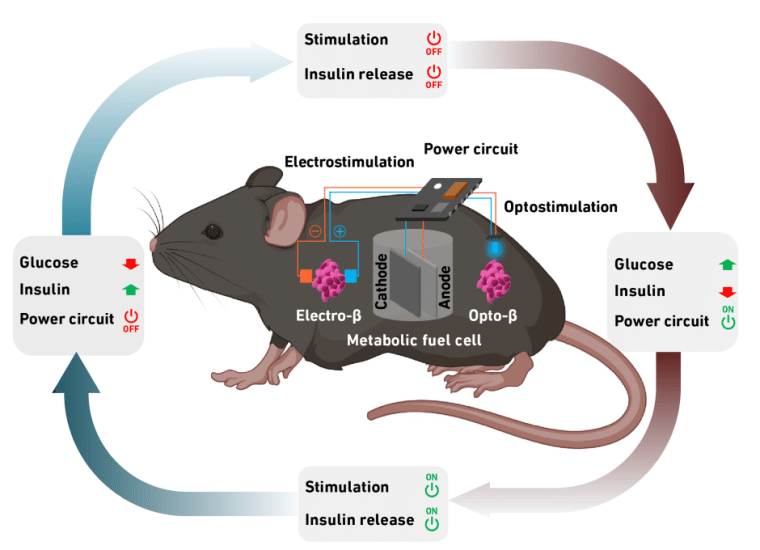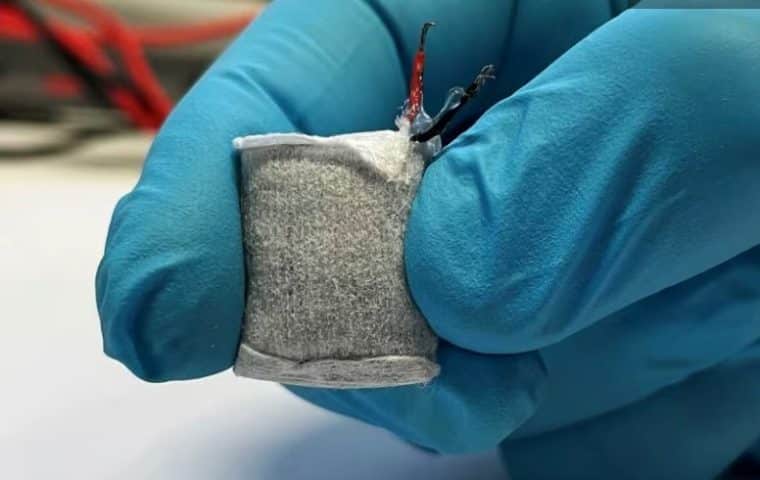The Department of Biosystems Science and Engineering at ETH Zurich has discovered a way to harness electricity from excess blood sugar to power biomedical devices such as pacemakers and insulin pumps.
According to Martin Fussenegger who leads the research team, “Many people, especially in the Western industrialized nations, consume more carbohydrates than they need in everyday life.”
He explains that this has caused obesity, diabetes, and cardiovascular diseases which gave birth to the idea to utilize this excess metabolic energy to produce electricity to power biomedical devices.
An Implantable Fuel Cell
For this application, the team came up with a copper-based nanoparticle electrode that produces energy by splitting glucose into gluconic acid and a proton, which then starts an electric circuit.
The cell is then covered with a material called alginate, which is derived from algae and frequently used in the medical industry, and is enclosed in a unique non-woven fabric giving it a tea-bag appearance.
After that, the fabric-encased fuel cell can be implanted beneath the skin, where the alginate can serve a dual purpose of absorbing biological fluids and providing a pathway for glucose to enter the fuel cell.
As a power source, the fuel cell can be connected to a capsule containing synthetic beta cells, which are artificial imitators of the cells that are normally stimulated to make insulin using electric current.
The fuel cell begins to produce energy as soon as it detects too much glucose, while cells are stimulated to manufacture and release insulin into the blood using this electrical energy. As a result, blood sugar levels return to normal.

Insulin and electricity production stop as soon as it goes below a predetermined threshold, creating a system that combines sustained power generation and controlled insulin delivery.
According to the team, not only does the electrical energy produced stimulate the production of insulin, but it is also sufficient to sustain communication with external devices such as smartphones which enable users to control their insulin pumps from their phones.
While the existing prototype has successfully been tested on mice, Fussenegger and his team are unable to create a marketable product citing financial and human resource constraints. The Department of Biosystems Science and Engineering hopes to find a more able partner with the required finances and skills.
Developments in the Biomedical Industry
Using blood sugar to power implantable biomedical devices is research ongoing for years. Despite the discoveries, researchers have hesitated to implement the solution due to the low amount of electricity such devices produce, making them unreliable for long-term use in critical devices such as pacemakers.
A team of researchers from the University of Massachusetts in Amherst discovered a solution to this problem. “The electricity produced by these devices is quite low, but it is a steady source. If we can find a way to store that electricity, we will then have a larger amount of electricity available for practical uses,” said Nikhil Malvankar, a member of the team.
The group came up with a charge pump which Malvankar said can be used to store the energy utilized in making pulses, like the ones needed to power a pacemaker.
While the researchers were able to create a fully operational charge pump that produces tens of microamps of current, a real practical application would need hundreds, says Sergey Shleev, a professor from Malmö University in Sweden who took part in the research.
“Right now for these devices long-term stability is still a major issue. Because if you want to use them for implantations, you are talking about years [of operational stability], and such stability has not been reached yet. We need to work on that,” he added.
Related Articles:
- Why Ambient Computing Means More APIs and That Equals More Security Risk
- Pet Influencers Boom Online But Handling Taxes For Our Furry Friends is Complicated
What's the Best Crypto to Buy Now?
- B2C Listed the Top Rated Cryptocurrencies for 2023
- Get Early Access to Presales & Private Sales
- KYC Verified & Audited, Public Teams
- Most Voted for Tokens on CoinSniper
- Upcoming Listings on Exchanges, NFT Drops
